Starting from January 1, 2018, the preferential tax policy for purchase of small-displacement cars with a displacement of 1.6L or less has been withdrawn, and the tax rate has been restored from the previous 7.5% to 10%. Just a 2.5% difference, for a 200,000 yuan small-displacement car, the purchase tax in January this year and last December, a difference of 4,274 yuan. For ordinary consumers, this is not a small sum.
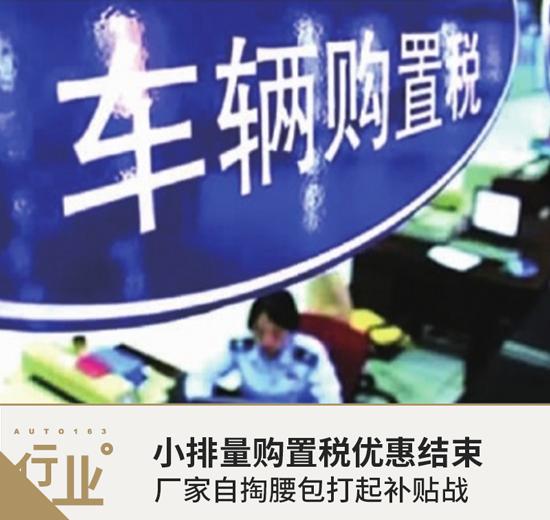
The small-displacement purchase tax preferential policy has a very obvious guiding role in the entire Chinese automobile market. According to Wilson's monitoring data, sales of passenger cars with a displacement of 1.6L and below in the country were 17,077,776 units in 2017, an increase of 0.4% year-on-year. Since the second half of 2017, the sales volume of passenger cars with 1.6L or less of displacement has been rising, reaching nearly 70%, which has become the main force for sales of passenger cars.
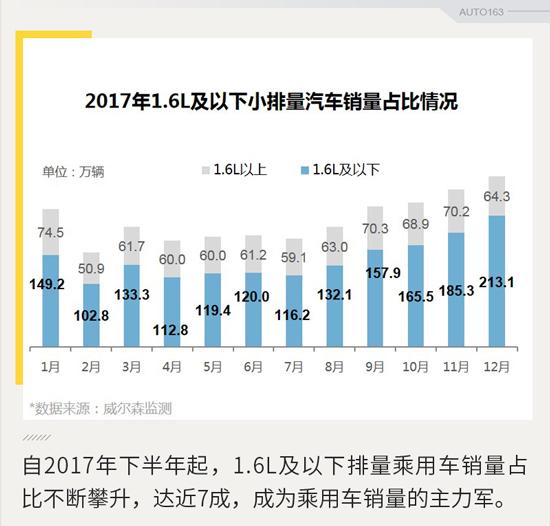
In December 2017, the volume of passenger vehicles in the country reached 3,418,656 units, a 37.7% increase from the previous quarter. It can be seen that the purchase tax concession ended on January 1st, 2018, allowing some consumers to release their car demand ahead of schedule and hurrying to catch the last-end purchase tax concession for the end of 2017.
After the decline in the preferential policies for small-scale purchase tax, can consumers still get benefits? Dealers and manufacturers will take what measures?
Dealer: Offer is flat with December
Recently, the Wilson agency conducted a survey of hundreds of dealers across the country. According to statistics, although some dealers said that sales were “involved,†the overall impact was not too great. 53.96% of the dealers stated that purchase tax preferential slope reduction had a general effect on the daily sales in the store.
Surprisingly, most dealers indicated that there was basically no recycling incentive in January, and the concessions were basically the same as in December 2017. Originally, manufacturers were influenced by many factors, such as press storage at the end of the year, preferential tax refund for purchase tax, and reduction of in-store traffic. In order to ease the sales pressure, dealers chose to maintain December concessions. Behind the concessions, there are support from major manufacturers.
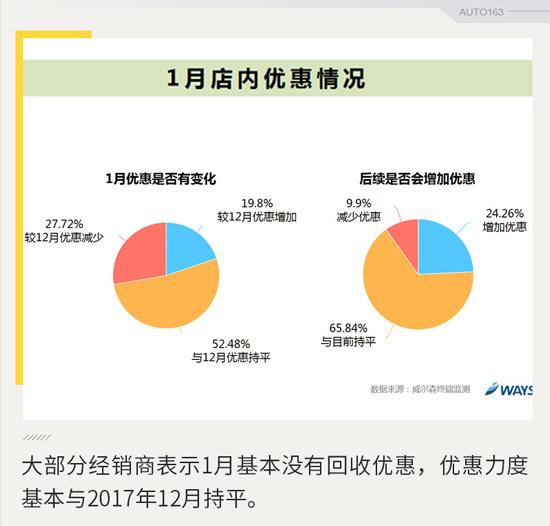
Manufacturer: Self-paying money for continuation of subsidies
For 1.6L and below displacement models, most manufacturers have introduced relevant policies to eliminate consumers' price concerns.
From the point of view of the joint venture brand, FAW-Volkswagen will provide policy support for vehicles with a displacement of 1.6L and below in December, giving support to orders placed in December and undelivered on December 31st. In addition, to support the sales in the first quarter, FAW-Volkswagen will provide 1500-2500 for new Jetta, Bora, Celestial, Golf, Sagitar and other models with a displacement of 1.6L or less after the small-displacement preferential policy is withdrawn. subsidy.
Dongfeng Nissan used the promotion season before the Spring Festival and added a new purchase tax subsidy from January 1 to February 15, 2018, to deliver vehicles with a displacement of 1.6L and below, and a subsidy of 1,200 yuan per vehicle.
FAW Toyota and SAIC-Volkswagen Skoda purchase tax subsidies are mainly for the delivery of orders in 2018, keeping the first quarter sales stable. FAW Toyota added a purchase tax continuation policy policy in November-December 2017. At the same time, from January 1 to February 28, 2018, dealers’ full-vehicle sales target for January-February reached 100% (inclusive) or more. , And there is no delayed payment at the end of January and February. The discounts for Corolla (D4T/1.6L) and Vios (SD/FS) are about 1100 yuan and 1,600 yuan, respectively, and the purchase tax will continue to be issued in November and December. One policy policy alternative. In the first quarter of 2018, SAIC-Volkswagen Skoda added a new purchase tax subsidy. The new Octavia and Octavia tour car models for the first time on or after January 1, 2018 will be subsidized by 2,500 yuan and 3,000 yuan respectively.

From the perspective of self-owned brands, both Changan Automobile and BYD paid purchase tax subsidies for customers who did not deliver orders on December 31, 2017 and achieved delivery from January 1 to March 31, 2018. 2.5%. On the other hand, Geely Automobile has launched a campaign to “subsidize 2.5% purchase tax on February 28, 2018†for all models to further enhance its market competitiveness.
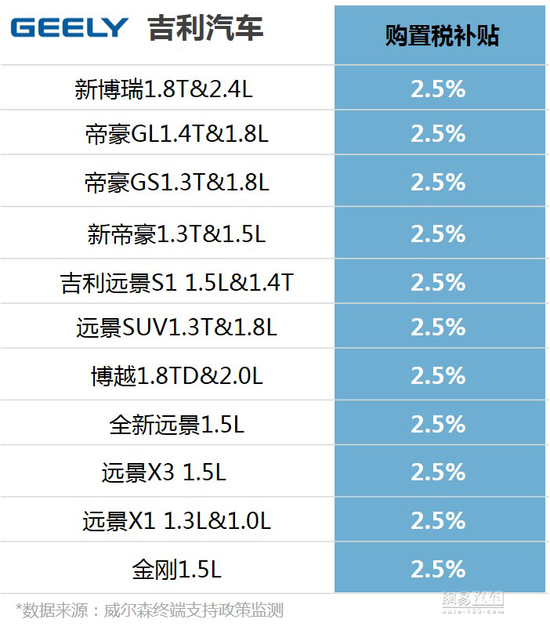
As for luxury brands, ABB's purchase tax subsidies for the relevant models vary. FAW-Volkswagen Audi announced that it will maintain its share of the market segments it belongs to, and announced January 1st to March 31st, 2018 that the models for domestic cars Q3 1.4T will extend the purchase tax subsidy for the fourth quarter of 2017 on A3 PA. The new model added 1.4T purchase tax subsidies, which is based on the market guidance price of 2.2% purchase tax subsidies. BMW requires dealers to complete 70% or more of the total retail requirements (including) before they can enjoy sales discounts for certain models, and have certain requirements for sales. They want to stimulate sales growth through sales discounts. Mercedes-Benz has a large amount of purchase tax subsidies for the corresponding models. From January 1, 2018 to February 28, 2018, consumers are given a 2.5% purchase tax subsidy for the purchase of Class A, Class B, Class C, and GLA models. And S500el is given a 10% purchase tax subsidy. In 2017, the difference between the sales volume of the top three luxury brands does not exceed 10,000. From the purchase tax subsidies, it can be seen that all three are trying their best to gain market share, which means ABB's sales volume.
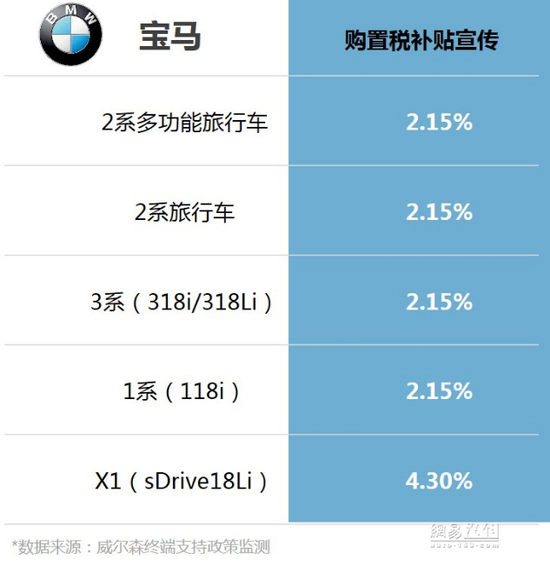
Overall, whether it is a joint venture, autonomy, or luxury brand, in order to cope with the decline of the national purchase tax preferential policies, most auto manufacturers continue to purchase preferential tax policies in 2018 mainly through “self-financing†methods. The purpose behind this subsidy war is to avoid the loss of tourists, seize market share, stimulate sales growth, and related to the overall sales volume in 2018. We must not take it lightly. Of course, some auto makers are still in short supply at the end of last year, hoping to seize the market to the maximum extent and reduce the loss of orders.
This shows that consumers who missed last year's preferential policies need not worry too much. However, after the national small-scale emission purchase tax preferential policy withdraws, the manufacturer's subsidies can continue until when it is not good. In addition to the benefits of purchasing small-displacement fuel vehicles, some consumers have also turned their attention to new energy sources.
On December 27, 2017, the Ministry of Finance, the State Administration of Taxation, the Ministry of Industry and Information Technology, and the Ministry of Science and Technology jointly issued the “Notice on the Exemption of Purchase Taxes for New Energy Vehicles†from December 1, 2018 to December 2020. On the 31st, purchase of new energy vehicles included in the catalogue was exempted from vehicle purchase tax. On the one hand, it is the small-displacement purchase tax concession stoppage. On the one hand, new energy vehicles are exempted from prolonged purchase tax, and the next airline of national orientation is already very obvious. This is undoubtedly the next opportunity for crowded car companies.
NINGBO RUICAN MACHINERY COMPANY is a professional supplier for casting and machined part which is widely used for Automobile, Medical, earthmover, petroleum, electricity Industry, and in long-term business with foreign customers from North America and west Europe, we are exactly know what's the customer requirement when they provide drawings and material specification. And our engineering dept. can suggest the best process and technology to make the component or any design changing if necessary. Most of our products are exported to Canada, USA, and west Europe Germany, France, Denmark, Italy, Norway,Turkey, Finland, Switzerland, etc. and win good reputation among our customers.
NINGBO RUICAN MACHINERY COMPANY cover different foundries and machining factories based on different casting process: Investment Casting, sand casting and pressure Die Casting, gravity casting, as well as precision machining with CNC machines.
NINGBO RUICAN MACHINERY COMPANY produces various Agricultural Machinery Parts according to the clients' technical drawings or samples.Various materials can be used,such as grey iron,ductile iron,carbon steel,steel alloy,stainless steel,aluminium,brass and so on.
Agricultural Machinery Parts
Agricultural Machinery Parts,Ductile Iron Agricultural Machinery Parts,Agriculture Machinery Spare Parts,Agricultural Parts Farm Machinery
Ningbo City Yinzhou Ruican Machinery Co.,Ltd , https://www.kstcasting.com